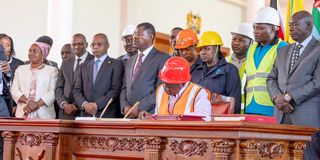Premium
Why it's not yet 'uhuru' for Ruto's new housing levy

President Ruto signs new Housing Bill into law
President William Ruto’s controversial flag-ship project- the housing levy could yet run into another legal headwind with experts warning it didn’t address the court’s concerns.
It is emerging that the Affordable Housing Act that entrenched the levy and which became law on Tuesday does not address the issues raised by the court that declared it unconstitutional on how the government will collect levy from those in informal employment.
The thorny issue of religion has also surfaced, with concerns that the law violates the Muslim finance principles that prohibit payment of interest rates.
Mr Dudley Ochiel, the High Court advocate who successfully represented the Katiba Institute in challenging the constitutionality and legality of the levy, said that they are studying the Act to establish its conformity to the constitution.
“We haven't read the assented version of the new Act yet,” said Mr Ochiel.
He went on; “we will be reading it keenly and if we find anything unconstitutional in it we will be heading to court. We trust that the courts can examine the new Act for compliance with the constitution.”
On Tuesday, President William Ruto signed into law the Affordable Housing Bill 2023 effectively entrenching the contentious 1.5 levy into law as decreed by the court.
The Bill was introduced in the House in December last year after the High Court declared it unfair, discriminatory, and unconstitutional, the housing levy was introduced following amendments to the Employment Act through the Finance Act 2023 that limited the levy to salaried employees in the formal sector.
To address the issues raised by the court, the Act has expanded the imposition of the monthly 1.5 percent affordable housing levy to include incomes other than salaries paid to employees in the formal employment sector.
The levy is to be paid to Kenya Revenue Authority (KRA), the collector not later than the ninth day of the month in which the gross salary was due or the gross income was received or accrued.

President William Ruto assents to the Affordable Housing Bill at State House, Nairobi in March 2024.
In doing so, the Act in section four states; “there is imposed a levy known as the Affordable Housing Levy.”
“The levy shall be at the rate of 1.5 percent of the gross salary of an employee or the gross income of the person received or accrued which is not subject to the levy,” the new law states.
While the Act seems to expand the imposition of the levy it does not explain how the government will collect the levy from those in informal employment.
“This is a gap that would likely see the petitioners return to court,” says Vihiga Senator Godfrey Osotsi.
Although Tharaka MP George Murugara, who chairs the Justice and Legal Affairs Committee of the National Assembly says the Act contains a provision on how the government will impose the levy on those in the informal sector- Bodaboda and Mama mboga- he did not pinpoint which section of the Act nor explain how it will be done.
“Yes. There is a provision on this. But regulations will have the nitty-gritty of this. Let’s wait for the regulations,” said Mr Murugara.
The Act establishes the Affordable Housing Fund, where the levies deducted from incomes and matched by the employers of the contributors with a similar amount, shall be paid, to be managed by the national board.
The law has also given reprieve to persons who made a voluntary saving and have not been allocated an affordable housing unit to apply for withdrawal of their savings by issuing a 90-day written notice for a refund with any accrued interest.
The voluntary contributor may apply to the National Housing Board for approval of the issuance of an affordable mortgage to develop a rural affordable housing unit.
The application will be accompanied by an agreement that the applicant agrees to have their saved deposits and the land upon which the unit is to be built to be used as collateral.
The Act goes on to say that the defaulted or unremitted amount shall be “summarily” recovered as a civil debt from the entity or person liable to remit the amount.
Currently, an employer who defaults in remitting the amount is liable to payment of a penalty equivalent to 2 percent of the unpaid funds for every month if the same remains unpaid.
President Ruto is targeting to construct 200,000 affordable housing units annually, which he has promised will create between 600,000 and 1 million jobs each year.
In a bid to actualise this, the National Assembly has appropriated and ring-fenced Sh73 billion in the current financial year’s budget towards the project that seeks to facilitate the provision of funds for affordable housing and affordable housing schemes in the promotion of homeownership among Kenyans.





